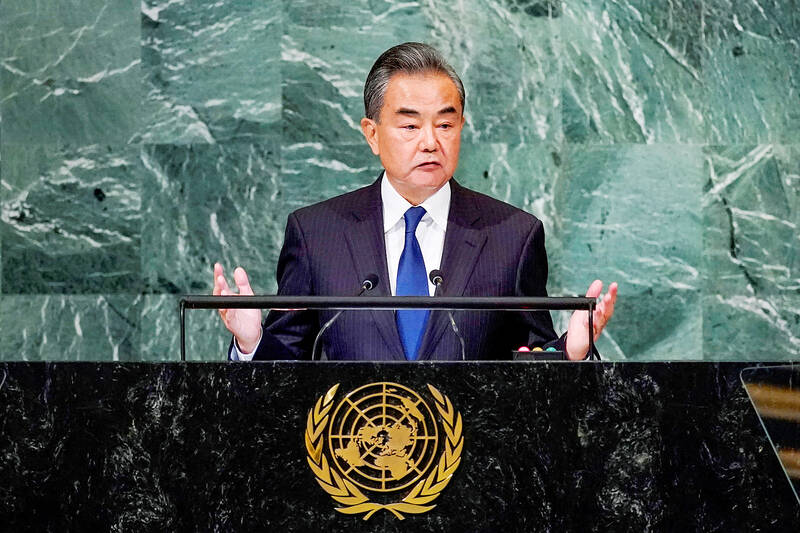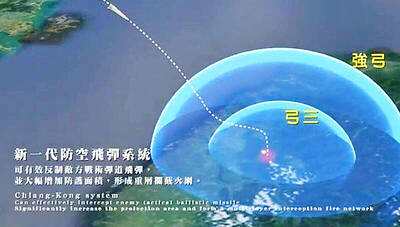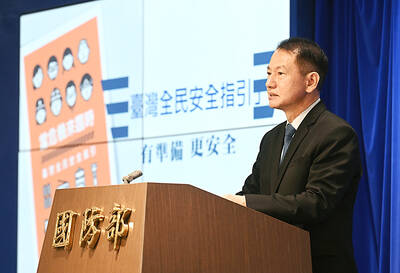Taiwan yesterday criticized Chinese Minister of Foreign Affairs Wang Yi (王毅) for “intentionally misinterpreting” a 1971 UN resolution to misrepresent Taiwan’s status to the global community.
In his address on Saturday to the UN General Assembly, Wang cited Resolution 2758 as a basis for Beijing’s claim that Taiwan is part of China.
He said that Beijing considers Taiwan an “inseparable part of China’s territory since ancient times.”

Photo: Reuters
“Only when China is completely reunified can there be enduring peace across the Taiwan Strait... Any move to obstruct China’s reunification is bound to be crushed by the wheels of history,” Wang said.
General Assembly Resolution 2758 ended the concept of “two Chinas” or “one China and one Taiwan,” he said.
“The ‘one China’ principle has become the basic norm in international relations and a consensus in the international community,” he said. “When entering into diplomatic relations with China, 181 countries all recognized and have accepted that there is one China in the world and Taiwan is part of China.”
In Taipei, the Ministry of Foreign Affairs said in a statement that the resolution transferred China’s seat in the UN from representatives of former president Chiang Kai-shek’s (蔣介石) government to the People’s Republic of China (PRC) without mention of Taiwan.
The resolution did not grant Beijing the right to represent the people or territory of Taiwan in the UN, nor did it say that Taiwan is part of the PRC, it added.
Beijing has been purposely and continually making a “twisted and incorrect political interpretation” of historical documents, it said.
Linking the resolution with Beijing’s “one China” principle isabsurd, it said, adding that the so-called principle does not represent international consensus.
China is resorting to every conceivable means to cut off Taiwan’s international participation and obstruct Taiwan’s opportunities to contribute to the international community, it said.
The Mainland Affairs Council also voiced protest against Wang’s statement, saying that Taiwan “has never belonged to the PRC for one day from the viewpoints of historical fact, international law and reality.”
“Taiwan’s future will be decided by the 23 million Taiwanese people,” it said, adding that the nation would never accept “any political premise or the final status of people across the Taiwan Strait unilaterally decided by Beijing.”
Adopted by the UN General Assembly on Oct. 25, 1971, Resolution 2758 recognized the representatives of the PRC government “as the only legitimate representatives of China to the United Nations.”
The wording reads: “[The UN decides] to expel forthwith the representatives of Chiang Kai-shek from the place which they unlawfully occupy at the UN and in all the organizations related to it.”
Since then, the Republic of China has not been a member of the UN, and efforts to participate in UN-affiliated organizations have been repeatedly thwarted by Beijing.
SEE SAINT ON PAGE 3

LIMITS: While China increases military pressure on Taiwan and expands its use of cognitive warfare, it is unwilling to target tech supply chains, the report said US and Taiwan military officials have warned that the Chinese People’s Liberation Army (PLA) could implement a blockade within “a matter of hours” and need only “minimal conversion time” prior to an attack on Taiwan, a report released on Tuesday by the US Senate’s China Economic and Security Review Commission said. “While there is no indication that China is planning an imminent attack, the United States and its allies and partners can no longer assume that a Taiwan contingency is a distant possibility for which they would have ample time to prepare,” it said. The commission made the comments in its annual

DETERMINATION: Beijing’s actions toward Tokyo have drawn international attention, but would likely bolster regional coordination and defense networks, the report said Japanese Prime Minister Sanae Takaichi’s administration is likely to prioritize security reforms and deterrence in the face of recent “hybrid” threats from China, the National Security Bureau (NSB) said. The bureau made the assessment in a written report to the Legislative Yuan ahead of an oral report and questions-and-answers session at the legislature’s Foreign Affairs and National Defense Committee tomorrow. The key points of Japan’s security reforms would be to reinforce security cooperation with the US, including enhancing defense deployment in the first island chain, pushing forward the integrated command and operations of the Japan Self-Defense Forces and US Forces Japan, as

INTERCEPTION: The 30km test ceiling shows that the CSIST is capable of producing missiles that could stop inbound missiles as they re-enter the atmosphere Recent missile tests by the Chungshan Institute of Science and Technology (CSIST) show that Taiwan’s missiles are capable of intercepting ballistic missiles as they re-enter the atmosphere and pose a significant deterrent to Chinese missile threats, former Hsiung Feng III missile development project chief engineer Chang Cheng (張誠) said yesterday. The military-affiliated institute has been conducting missile tests, believed to be related to Project Chiang Kung (強弓) at Pingtung County’s Jiupeng Military Base, with many tests deviating from past practices of setting restriction zones at “unlimited” and instead clearly stating a 30.48km range, Chang said. “Unlimited” restrictions zones for missile tests is

PUBLIC SAFETY: The nationwide distribution campaign aims to enhance society’s overall understanding of threats and bolster defense awareness, an official said The latest edition of the National Public Safety Guide is being mailed to all citizens starting today to foster public awareness of self-defense in the event of war or natural disasters, the Ministry of National Defense said yesterday. “The guides will be disseminated to the public to enhance society’s overall understanding of threats and bolster defense awareness, demonstrating the government’s emphasis on people’s safety and its determination to pursue self-defense,” All-out Defense Mobilization Agency Director Shen Wei-chih (沈威志) said at the ministry’s news conference. The nationwide distribution campaign was planned according to President Lai William’s (賴清德) Sept. 20 directive, he said, adding